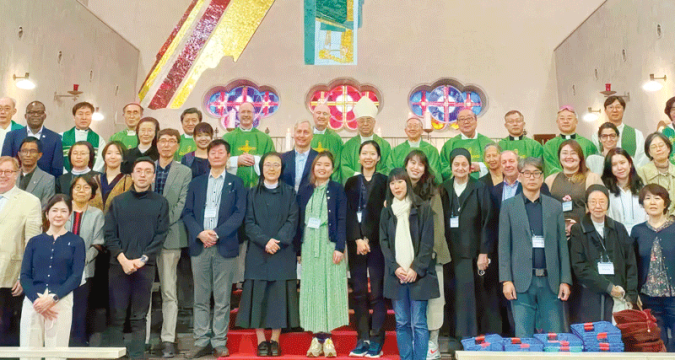
(UCAN): Delegates from the bishop’s conferences of South Korea, Japan and the United States joined a peace forum to discuss the role of the Catholic Church in promoting peace and reconciliation in the Korean Peninsula and Northeast Asia.
The two-phased meeting, held in South Korea from October 25 to 27 and in Japan’s Hiroshima World Peace Memorial Cathedral from October 28 to 29, was themed “2023 Catholic Korean Peninsula Peace Forum” and held in South Korea and Japan, according to a press release from the Korean Catholic Bishops’ Conference [CBCK]. The forum meetings were.
The event was co-hosted by the Korean Bishops’ Committee for National Reconciliation and the Catholic Institute for Peace in East Asia under the Diocese of Uijeongbu and participants included three archbishops, eight bishops, dozens of priests, and laity from all three participating countries,
They discussed major issues including the environment and nuclear disarmament, food shortages, water shortages, collapse of social infrastructure, economic poverty, health, and sanitation crises arising due to climate change.
The forum aimed to “strengthen solidarity among the Korean, American and Japanese bishops’ conferences in promoting peace in Northeast Asia,” the Korean bishops’ conference said.
They discussed major issues including the environment and nuclear disarmament, food shortages, water shortages, collapse of social infrastructure, economic poverty, health, and sanitation crises arising due to climate change
The forum intended to “explore the role of religion and civil society in reducing military tensions on the Korean Peninsula and in Northeast Asia in the face of the climate crisis.”
The forum also discussed on means to “promote understanding of the denuclearisation of the Korean Peninsula and the peace-building role of the Catholic Church in achieving these goals.”
Archbishop Joseph Mitsuaki Takami, the retired archbishop of Nagasaki presided over the closing Mass at the Hiroshima World Peace Memorial Cathedral on October 29.
Archbishop Takami pointed out that the long history of the region must be considered during the peace-building process.
“When we think of peace on the Korean Peninsula and in Northeast Asia, we must look back at the course of history as objectively as possible,” the archbishop said.
He emphasised the need to “reflect deeply on the responsibilities of the politicians, soldiers, and people who shaped that history, as well as the unspeakable pain and sorrow of countless people.”
When we think of peace on the Korean Peninsula and in Northeast Asia, we must look back at the course of history as objectively as possible
Archbishop Takami
Bishop Simon Kim Joo-young of Chuncheon, South Korea, who is also chairperson of the Korean Catholic Bishops’ Committee for National Reconciliation lauded the young people for their peace activism during the “Youth Peace Talk” held on October 28.
“When I was a young man, I didn’t think about peace and reconciliation. I am grateful for the young people who are thinking about it now,” Kim said.
On October 27, Kim Sung-kyung a professor of the North Korea Graduate University delivered a lecture on “70 Years of Armistice” when he spoke about the Korean War, the armistice, and the aftermath on the Korean Peninsula.
Bishop Peter Lee Ki-heon of Uijeongbu, alleged that peace in the Korean peninsula was unachievable due to “the vested interests of neighbouring nations.”
Lee said, “We have experienced through history that the obstacle to peace on the Korean Peninsula is not only the conflict of interests between the two Koreas or the lack of dialogue.”
He added that “the existence of neighbouring powers that try to use the Korean Peninsula problem for their own interests,” was a stumbling block in the path to peace.
“In this time when peace is threatened, let us think about peace with the eyes of faith while earnestly hoping for peace,” Lee added.
On October 26, the forum discussed nuclear disarmament, the arms race, and the climate crisis in the region.
Hye-Jung Lee, a professor at the Department of Political Science and International Studies at Chung-Ang University, while speaking on the topic of “Nuclear Threat and Arms Race” pointed out that both North and South Korea were contributing to the Russia–Ukraine war.
“As a US ally, South Korea has participated in economic sanctions against Russia and has consistently been asked to provide support [including military] to Ukraine,” Lee said.
As “one of Russia’s most consistent and committed supporters throughout the Russo-Ukrainian war, North Korea’s strategic cooperation with Russia is likely to prolong the war in Ukraine and the tense situation on the Korean Peninsula,” Lee added.
The forum also discussed the Israel–Hamas conflict, nuclear weapons, and the threat of nuclear waste among other topics.


